

The Flight From Conversation. At home, families sit together, texting and reading e-mail.
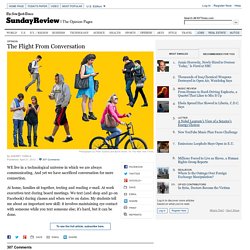
At work executives text during board meetings. We text (and shop and go on Facebook) during classes and when we’re on dates. My students tell me about an important new skill: it involves maintaining eye contact with someone while you text someone else; it’s hard, but it can be done. Over the past 15 years, I’ve studied technologies of mobile connection and talked to hundreds of people of all ages and circumstances about their plugged-in lives. Feeling Anxious? Soon There Will Be an App for That. “I did not notice any positive effect,” one woman with social anxiety who participated in the Harvard study said in an e-mail.
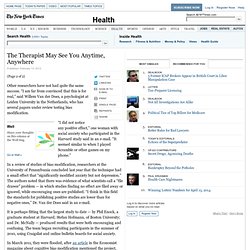
“It seemed similar to when I played Scramble or other games on my phone.” In a review of studies of bias modification, researchers at the University of Pennsylvania concluded last year that the technique had a small effect that “significantly modified anxiety but not depression.” The authors noted that there was evidence of what scientists call a “file drawer” problem — in which studies finding no effect are filed away or ignored, while encouraging ones are published. “I think in this field the standards for publishing positive studies are lower than for negative ones,” Dr. Van der Does said in an e-mail. It is perhaps fitting that the largest study to date — by Phil Enock, a graduate student at Harvard; Stefan Hofmann, of Boston University; and Dr.
The New York Times - Breaking News, World News & Multimedia. Culture: Leading Scientists Explore Societies, Art, Power, and Technology. By Maria Popova What 14th-century cathedrals have to do with Google, Darwin and the purpose of art’s existence. Yesterday, we devoured The Mind — the first in a series of anthologies by Edge.org editor John Brockman, curating 15 years’ worth of the most provocative thinking on major facets of science, culture, and intellectual life.
On its heels comes Culture: Leading Scientists Explore Societies, Art, Power, and Technology — a treasure chest of insight true to the promise of its title, featuring essays and interviews by and with (alas, all-male) icons such as Brian Eno, George Dyson and Douglas Rushkoff, as well as Brain Pickings favorites like Denis Dutton, Stewart Brand, Clay Shirky and Dan Dennett. From the origin and social purpose of art to how technology shapes civilization to the Internet as a force of democracy and despotism, the 17 pieces exude the kind of intellectual inquiry and cultural curiosity that give progress its wings. Images via Flickr Commons Share on Tumblr. Technology Provides an Alternative to Love. Mind Reading: Technology Turns Thought Into Action.
Hide captionA patient participates in a brain-computer interface study.
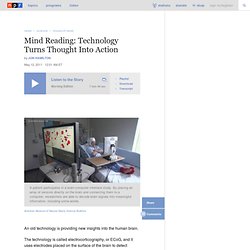
By placing an array of sensors directly on the brain and connecting them to a computer, researchers are able to decode brain signals into meaningful information, including some words. American Museum of Natural History Science Bulletins An old technology is providing new insights into the human brain. The technology is called electrocorticography, or ECoG, and it uses electrodes placed on the surface of the brain to detect electrical signals coming from the brain itself. Doctors have been using ECoG since the 1950s to figure out which area of the brain is causing seizures in people with severe epilepsy.
In one recent experiment, researchers were able to use ECoG to determine the word a person was imagining. The Amazing Power of "Tech Breaks" It is late afternoon and I am feeling decidedly blah.
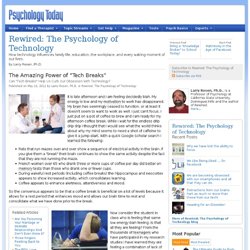
My energy is low and my motivation to work has disappeared. My brain has seemingly ceased to function, or at least it doesn't seem to want to work as well. The Art of Immersion. The Techno-Human Condition. We were challenged several years ago to undertake a study of how powerful emerging technologies (that is, the Five Horsemen: nanotechnology, biotechnology, robotics, information and communication technology, and applied cognitive science) were affecting human capabilities from an environmental perspective.
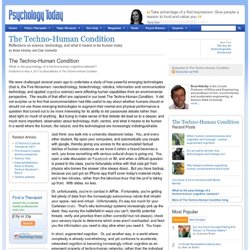
The results of that effort are captured in our book The Techno-Human Condition. It did not surprise us to find that environmentalism had little useful to say about whether humans should or should not use these emerging technologies to augment their mental and physical performance-a question that turned out to be more interesting for its ability to stir passionate debate rather than shed light on much of anything. 8 Reasons Why Twitter Can Boost Your Happiness. I’m a huge fan of Twitter , and I've tried to persuade several people to give it a try.
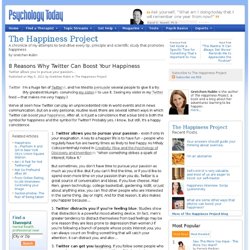
(My greatest triumph: convincing my sister to use it. Seeing my sister in my Twitter feed -- that makes me happy.) We've all seen how Twitter can play an unprecedented role in world events and in news communication. But on a very personal, routine level, there are several (other) ways in which Twitter can boost your happiness . After all, is it just a coincidence that a blue bird is both the symbol for happiness and the symbol for Twitter? 1 But sometimes, you don’t have time to pursue your passion as much as you’d like. 2. . 3. .